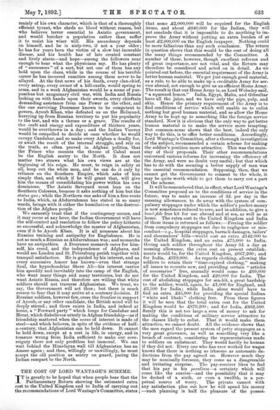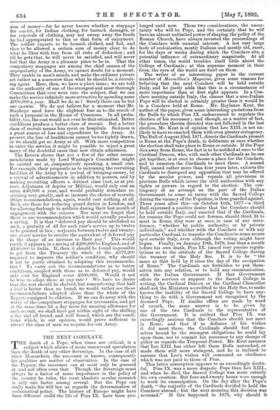THE COST OF LORD WANTAGE'S SCHEME.
IT is greatly to be hoped that when people hear that the Parliamentary Return showing the estimated extra cost to the United Kingdom and to India of carrying out the recommendations of Lord Wantage's Committee, states that some £2,000,000 will be required for the English items, and about £840,000 for the Indian, they will not conclude that it is impossible to do anything to im- prove the Army without putting an extra burden of at least £2,000,000 on the English taxpayer. Nothing could prove the Army without putting an extra burden of at least £2,000,000 on the English taxpayer. Nothing could be more fallacious than any such conclusion. The return in question shows that this would be the cost of doing all the many things recommended by the Committee. A number of these, however, though excellent reforms and of great importance, are not vital, and the Return may therefore be considered and acted on in detail. As we pointed out before, the essential requirement of the Army is better human material. We get just enough good material, as a rule, to be able to make up a creditable Army for ser- vice abroad, not enough to give us an efficient Home Army. The result is that our Home Army is, as Lord Wolseley said, "a squeezed lemon." India, Egypt, Malta, and Gibraltar have all the juice, and we have only the pips, pulp, and skin. Hence the primary requirement of the Army is to find conditions of service which will enable us to enlist nothing but good human material, and so allow the Home Army to be kept up to something like the foreign service standard. Now it is obvious that the only way to get better human material is to make the service more tempting. But common-sense shows that the best, indeed the only way to do this, is to offer better conditions. Accordingly, Lord Wantage's Committee, after a thorough investigation of the subject, recommended a certain scheme for making the soldier's position more attractive. This was the main- stay of their proposals. Their other recommendations concerned various reforms for increasing the efficiency of the Army, and were no doubt very useful ; but that which has to do with the securing a better supply of men was the essential recommendation. Supposing, then, that we cannot get the Government to consent to the whole, it may be quite worth while to get them to carry out a part of the scheme.
It will be remembered that, in effect, what Lord Wantage's Committee proposed as to the conditions of service in the future, was to make an increase of 3d. per day in the messing allowances, to do away with the system of com- pulsory stoppages under which the soldier's pocket-money is now sometimes reduced to zero, and in addition, to give a bond-fide free kit for use abroad and at sea, as well as at home. The extra cost to the United Kingdom and India of these items is returned as follows :—Freeing the soldier from compulsory stoppages not due to negligence or mis- conduct—e.g., hospital stoppages, barrack damages, tailors' and shoemakers' bills—would cost an extra £142,000 to the United Kingdom, and an extra £75,000 to India.. Giving each soldier throughout the Army 3d. a day as messing allowance, the extra cost on present establish- ments would be, for the United Kingdom, £667,200; and for India, £319,000. As regards clothing, allowing the soldiers to retain their "time-expired clothing," making all issues to recruits new, and providing certain "articles of necessaries" free, annually would come to .269,000- for the United Kingdom, and £20,000 for India. The cost of abolishing stoppages for sea-kit, a great hardship to the soldier, would, again, be £1,000 for England, and £3,500 for India ; while India alone would have to find an extra .R./15,000 for providing the special Indian "white and khaki" clothing free. From these figures it will be seen that the total extra cost for the United Kingdom would be £879,200; and for India, £462,500.
Surely this is not too large a sum of money to ask for making the conditions of military service attractive to the classes likely to enlist. That it would make them attractive, we cannot doubt. All the evidence shows that the men regard the present system of petty stoppages as a very great grievance, as well as something very like a breach of contract, considering the representations made to soldiers on enlistment. They would hardly be human if they did not. Every one who has ever worked for wages knows that there is nothing so irksome as automatic de- ductions from the pay agreed on. However much they may be nominally foreseen, they come as a disagreeable and irritating surprise. The pay-receiver likes to feel that his pay is his peculium—a certainty which will come like the sunrise—and the possibility that it may be docked of a sixth, or even a twelfth, is a per- petual source of worry. The private cannot with any satisfaction plan out how he will spend his money —such planning is half the pleasure of the posses- sion of money—for he never knows whether a stoppage for sea-kit, for Indian clothing, for barrack damages, or for renewals of clothing, may not sweep away the funds he had appropriated to this or that form of enjoyment. The soldier expects to be housed, clothed, and fed, and then to be allowed a certain sum of money clear to do what he likes with free from all risks of deduction ; and till he gets that, he will never be satisfied, and will never feel that the Army is a pleasant place to be in. That the compulsory stoppages are among the chief causes of the unpopularity of the Army, we cannot doubt for a moment. They rankle in men's minds, and make the ordinary private act rather as a scarecrow than what he should be, a recruit- ing agent. Here, then, we have a plain issue ; we are told on the authority of one of the strongest and most thorough Committees that ever went into the subject, that we can make the service infinitely more attractive by spending some £900,000 a year. Shall we do so ? Surely there can be but one answer. We do not believe for a moment that Mr. Stanhope need have the slightest fear as to the result of such a proposal in the House of Commons. In all proba- bility, too, the cost would not even be that estimated. Better conditions produce a better class of recruit. But a better class of recruit means less spent on hospitals. Sickness is a great source of loss and expenditure to the Army. At present, the line of healthiness cannot be too tightly drawn, or we should get no Army at all. With more competition to enter the service, it might be possible to reject a great many of the doubtful cases that now obtain admission.
The Return shows that not a few of the other recom- mendations made by Lord Wantage's Committee might be carried out at, comparatively speaking, a small cost. For example, their proposals as to increasing the recruiting facilities of the Army by a revival of bringing-money, by a revival of advertisements in addition to posters, and by making recruiting officers a distinct class (not, as at pre- sent, Adjutants of depots or Militia), would only cost an extra .e40,000 a year, and would probably stimulate re- cruiting very greatly, and so increase the choice of recruits. Other recommendations, again, would cost nothing at all. Such are those for reducing guard duties in London, and for allowing furlough to soldiers during their last month of engagement with the colours. Nor must we forget that there is one recommendation which would actually produce a saving. It is that "deferred pay should be abolished as such, a gratuity of otl for each year's service up to twelve to be granted in lieu ; serjeants between twelve and twenty- one years' service to receive the equivalent of deferred pay in the shape of an increase to their pay." This would result, it appears, in a saving of .2280,000 to England, and of £140,000 to India. If, then, it should be found impossible to get from the Treasury the whole of the £879,200 required to improve the soldier's condition, why should it not be partly obtained by adopting this recommenda- tion P To carry out the recommendations as to better conditions, coupled with those as to deferred pay, would only cost for England some £600,000. Would it not be wise to adopt these at any rate ? We have no desire that the rest should be shelved, but remembering that half a loaf is better than no bread, we would rather see these recommendations adopted alone than the whole of the Report consigned to oblivion. If we can do away with the worry of the compulsory stoppages for necessaries, and get at the same time 3d. a day more for messing allowance for each recruit, we shall have got within sight of the shilling a. day and all found, and well found, which are the condi- tions which, in our opinion, would prove sufficient to attract the class of men we require for our Army.







































 Previous page
Previous page